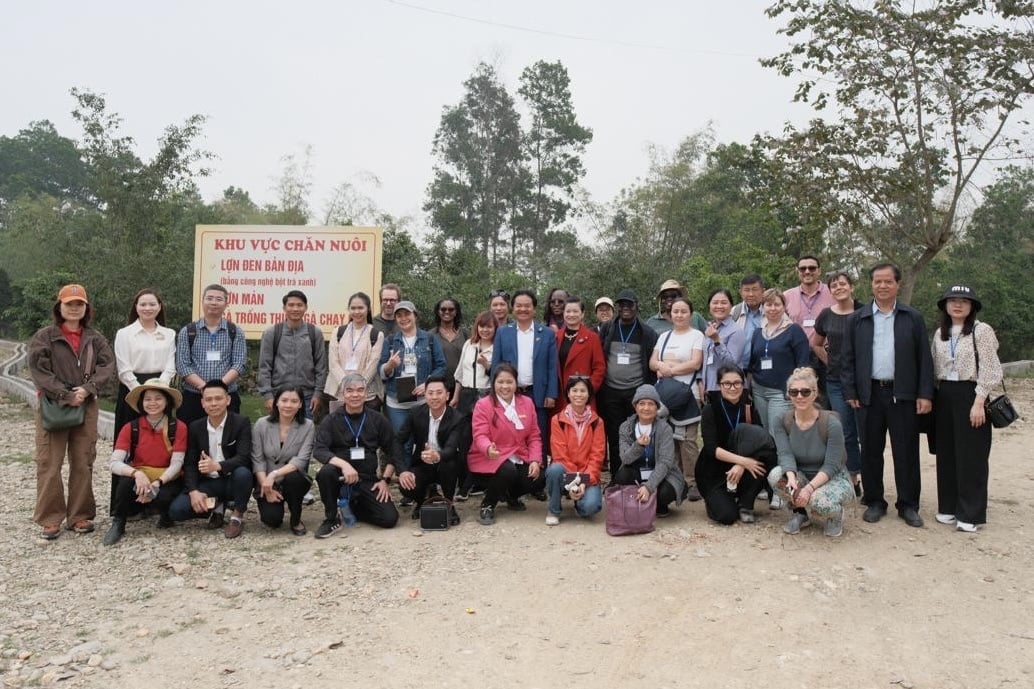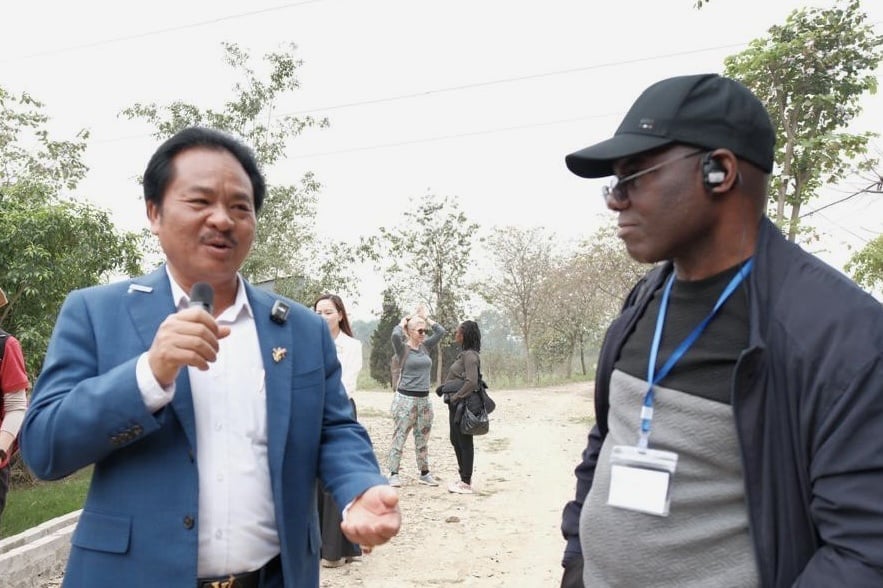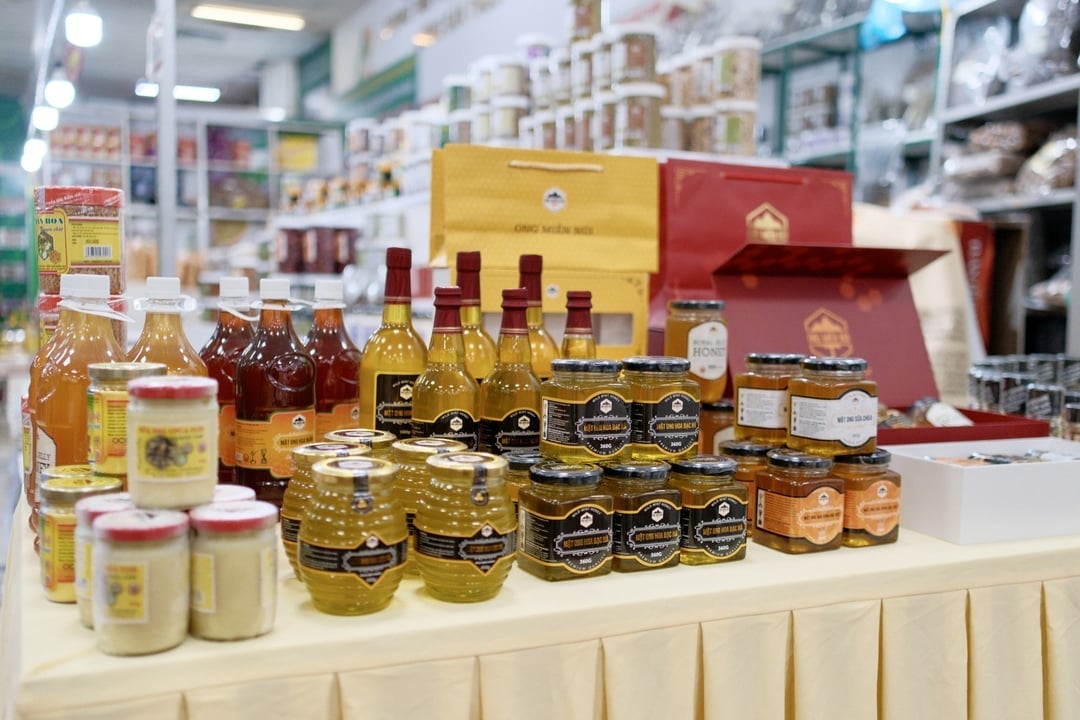December 6, 2025 | 04:29 GMT +7
December 6, 2025 | 04:29 GMT +7
Hotline: 0913.378.918
December 6, 2025 | 04:29 GMT +7
Hotline: 0913.378.918
South-South Cooperation is evolving, moving beyond the simple exchange of experiences toward joint investments and collaborative implementation of initiatives that directly benefit farmers. In this pathway, Vietnam is seen as a model partner for Africa.
According to Dr. Babafemi Oyewole, CEO of the Pan-African Farmers’ Organization (PAFO), Vietnam has made practical and meaningful contributions to South-South Cooperation with Africa, particularly in the field of agriculture.
Since 2002, Vietnamese experts have supported Mozambique in improving rice cultivation methods, land rehabilitation, and irrigation systems, helping to increase rice yields from 1.5 to 4.5 tons per hectare. In addition, Dr. Oyewole has highly praised tilapia and pangasius farming models introduced in Uganda and Nigeria for their suitability, use of local resources, and positive impact on the quality of native fish breeds.

A delegation from Global South countries visited an ecological farming model in Vietnam. Photo: Quynh Chi.
Vietnam’s contributions go beyond technical support as it also shares valuable experience in agricultural extension models and cooperative reform, notably with Rwanda. Vietnam’s new-style cooperative model has helped enhance farmers’ bargaining power, improve services, and increase access to finance. “Rwanda adapted parts of the Vietnamese New Rural Development approach to boost rural enterprise and social infrastructure planning,” said Dr. Oyewole.
Recalling his previous visit to Vietnam, Dr. Babafemi Oyewole was particularly impressed by the country’s approach to community-based ecological agriculture, rooted in policy support and local identity. Vietnam has demonstrated that agroecological farming can both adapt to climate change and deliver economic returns, especially when driven by community leadership and backed by government support.

Dr. Babafemi Oyewole (right side) said that Vietnam's experiences in climate-vulnerable areas, such as the Mekong Delta, offer valuable lessons for Africa. Photo: Quynh Chi.
“Many of Vietnam’s agroecological methods are rooted in traditional knowledge - refined and scaled through peer learning, farmer field schools, and local cooperatives,” he said.
Vietnam is a compelling example of how agroecology can be scaled up responsibly through a harmonious combination of traditional knowledge, science, and policy innovation. Vietnam's experience is not only inspiring but also particularly relevant to Africa, where smallholder farmers are looking for climate-smart, inclusive, and cost-sustainable solutions to address food system challenges, he affirmed.
Sharing with the Vietnam Agriculture and Nature Newspaper about the expectations for the Inter-regional High-Level Forum on the OCOP model, Dr. Oyewole expressed his belief that this event will open a new chapter for South-South Cooperation between Vietnam and African countries.
Dr. Oyewole emphasized: "I hope that this exchange will not only create innovative models but also inspire long-term partnerships that elevate smallholder farmers and sustainable value chains at the heart of global food systems."
According to him, South-South Cooperation needs to move beyond simply sharing experiences to more practical cooperation for joint investment and joint implementation. With the OCOP platform, countries can not only cooperate in developing processing infrastructure to increase product value but can also jointly research and apply smart production technologies to adapt to climate change.

Beekeepers are able to adopt new technologies and create OCOP products. Photo: Quynh Chi.
At the same time, mobilizing regional organizations and the private sector will create more momentum for expanding markets for specialty products such as coffee, spices, food, and tropical fruits.
"The shift from bilateral learning to collective enterprise for building resilient, regional value chains. Then, added value is distributed fairly and benefits spread to producers," the head of PAFO analyzed.
In addition, Mr. Oyewole also expects that dialogues within the OCOP framework will promote policy coherence between countries with similar ecological agriculture and socio-economic conditions.
This is an opportunity to jointly build common standards on quality, certification and traceability; share effective organizational models, such as Vietnam’s cooperative system or Ethiopia’s commodity exchanges.
According to him, expanding the participation of local people in the cooperation process, especially farmers, women, and youth, is indispensable. The OCOP model needs to create conditions for farmer groups to exchange experiences directly with each other, participate in building market strategies for their own products, and introduce successful community-led initiatives, from agricultural processing to branding.
He believes that South-South Cooperation is only truly effective when producers at the grassroots level are listened to and empowered. Only when South-South Cooperation reaches the local level and improves livelihoods will it truly create sustainable change.
The Pan-African Farmers’ Organization (PAFO) is a continental platform with Regional Farmer’s Networks as members. Its Constitutive Assembly was held under the sponsorship of the African Union in Lilongwe, Malawi, from October 27 to 29, 2010. PAFO is recognized as the representative body of African farmers’ organizations at the highest continental level.
PAFO is the voice of more than 80 million African farmers integrated into 73 national organizations present in more than 49 countries on the continent, operating at the heart of African agriculture. It has empowered youth and women farmers to access finance, adopt best agricultural practices, inputs, access markets and promoted an enabling environment for smallholder farmers through its advocacy and policy influence strategies.
Translated by Kieu Chi

(VAN) As of 2025, the ASEAN region has a total of 69 ASEAN Heritage Parks recognized across its 10 member states. Among them, Viet Nam contributes 15 ASEAN Heritage Parks.

(VAN) Yok Don National Park has high biodiversity with numerous endemic plant and animal species, and it is also the only dipterocarp forest ecosystem conservation area in Viet Nam.

(VAN) Viet Nam and Brunei signed two important MOUs on fisheries and IUU, expanding cooperation in agriculture, the environment, and Halal exports, aiming to substantively implement joint projects.

(VAN) The Viet Nam Coconut Association worked with the International Finance Corporation (IFC) and businesses to promote the supply chain, enhance competitiveness, and develop the coconut industry sustainably.
![Hue aims for Net Zero: [2] Pioneering low-emission tourism](https://t.ex-cdn.com/nongnghiepmoitruong.vn/608w/files/huytd/2025/12/04/0633-dulichzero-4-095634_236-161125.jpg)
(VAN) The ancient capital of Hue has developed Net Zero tourism products and models, aiming to reduce carbon emissions and pioneer the establishment of Viet Nam's green tourism destination.

(VAN) C.P. Viet Nam has announced the successful completion of its goal to plant 1.5 million trees during the 2021-2025 period, a key milestone within company's long-term ESG strategy and its roadmap for emission reduction.

(VAN) This is an initiative of MAE aimed at creating a unified coordination mechanism to implement agricultural cooperation programs with developing countries.